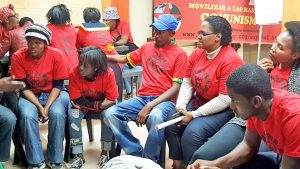
This is the second part of a report from a US comrade who visited South Africa in May 2025. Part I described conditions in Gqeberha (Port Elizabeth) and examples of the growth of ICWP there.
ICWP’s communist work in South Africa did not fall from the sky. It has not always been smooth or easy. An experienced comrade in the US, supported by other comrades, has worked consistently and untiringly. I learned a lot from what I saw first-hand of his decade-long struggle.
The comrade’s patience and persistence. Regular frequent phone calls between visits. Listening thoughtfully. Carefully choosing points of struggle and following through. Building relationships that enable conversations about difficult topics, personal as well as political. In it for the long haul. Not giving up on comrades even when ties are strained. I need to work on these things.
I met comrades who have been with us for over ten years. Others who were active, backed off, and have returned. Some who were around for years before joining.
Every new comrade has struggled against capitalist ideas like cynicism, individualism, nationalism, and more. “There was a conversation going on in my head,” one said.
The key struggle in South Africa (and not just there) is the fight to build a leading core collective. An important advantage is that these comrades appreciate one another’s different strengths and contributions. They are also building an expanded leadership collective, looking forward to growth.
Developing Communist Leaders Now for a Mass ICWP
Capitalism tells us a “leader” is an “expert” like Lenin, Mandela, MLK, or Fidel. Someone appointed or elected to a position of power. Someone special. Capitalist education promotes “leadership qualities.”
ICWP’s emerging work in South Africa points toward a very different concept of communist leadership. Our new organizer in Grahamstown, our high school comrade, the VW shop steward are all leading masses toward communism.
Some might think they don’t yet understand our line well enough to be Party leaders. This would be a mistake. We say that we want “masses to lead.” That means now. Not in the distant future.
Our task is to help all comrades become better communist leaders. We understand that development is always uneven, and not always along the same path. As the old slogan said, “What you know – teach. What you don’t know – learn.”
Let’s not ask “who will be the leader?” Instead let’s ask: Who will take more responsibility? For what Party work in particular? Who is committed to collectively advancing that work? To learn through practice, self-criticism, and criticism?
We should ask every comrade: What contribution can you make? What do you need, or need to know, to do the work better? What motivates you to move forward? What holds you back?
We must encourage the initiative and build the confidence of the comrades mentioned above, and many more. They are developing communist leaders. As are we all.
The theoretical development of active newer comrades is crucial. The written materials we produce must meet their needs. These materials must also reflect what we are all learning from their work.
The South Africa comrades struggle to read Red Flag, study dialectical materialism, distribute our literature, explain the Party line. We must learn to write for Red Flag in ways that are clear to them. Clear enough so they can explain more of our line to the masses that hunger for it.
Comrade Q sat in meetings for years, baffled. Finally, she spoke up and denounced the “bombast” that meant nothing to her. Now she is finding and using her own communist voice. And she is struggling to read and write more. So are other comrades in SA.
We must enlist the South Africa comrades in helping to create new dialectical materialism and other study materials – for listening as well as reading – that better meet the needs of a mass party.
The final section of this report will focus on how comrades integrate ourselves in the struggles of the masses. And on the need for more energetic and consistent fundraising to support the work of ICWP.

